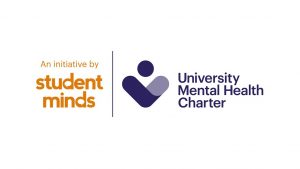University Mental Health Day
By iomh, on 2 March 2022
By Dominic Wong, UCL Student Support and Wellbeing and Project Coordinator on UCL’s submission for the University Mental Health Charter.

The mental health landscape in higher education has changed significantly in the past few years. This is partially due to culture shifts in society, but the quickest change has been during Covid with more and more students and staff reporting mental health issues. This has led to universities seeing a huge demand for their support services. This increased demand has forced universities to take mental health more seriously by making it a strategic priority implementing a whole university approach.
University Mental Health Day (3rd March 2022) brings together the student community in an effort to make mental health a university-wide priority across the UK. It’s perhaps the perfect time to share my experience of project managing UCL’s submission for the University Mental Health Charter Award, but first here’s a little background to the Charter and Award.
University Mental Health Charter Award (UMHCA)
The Charter framework provides a set of evidence-informed principles to support universities across the UK in prioritising student and staff mental health. Among other principles, the Charter lays out details of how to create effective support services alongside an environment and culture that promote good mental health for the whole university community. As part of UCL’s submission, we had to draft a 20,000-word document about its approach to each of the 18 themes of the Charter.
My experience
I was attracted to this role as it aligns very well with my background of completing a PhD in Health Psychology, and working as a Student Adviser, Teacher, Examiner, and Project Manager. I know from personal and professional experience that mental health issues such as chronic stress can be extremely damaging but can be overcome with support. For example, as part of my PhD, I ran a successful 7-week online workplace stress intervention using CBT practices that improved employees’ self-efficacy, social support seeking behaviours, job satisfaction, sickness absence, and physical health symptoms.
Since I started this role last June, UCL has made great strides in its journey down the path of submission. As the Award is based on a university-wide approach, I’ve not done this alone – colleagues from all across UCL have contributed. For example, we’ve had meetings with representatives from each of the 11 faculties, sharing their experiences of all things related to mental health and wellbeing, from enhancing personal tutor support to creating more social spaces. But this has not only been a staff endeavour. We thought it best for UCL students to be involved fully and as such many of the Sabbatical Officers have shared their feedback on our submission and worked together with our Staff domain leads on different sections of our report. It’s been great to see all the examples of excellent practice happening in each faculty and at the university as a whole. Of course, given the sheer size of UCL, the broad range of faculties (with their own strong identities) and the amount of people and teams involved in providing support (but not always being aware of what each are doing) there are also many challenges. However, it’s been humbling and heartening to see colleagues giving honest appraisals of our shortcomings and discussing with them about what we can do to overcome them.
Example challenge and moving forward
Although Student and staff wellbeing strategies are aligned and monitored through one implementation oversight group, the teams that run them are separate. Following UCL’s submission to the award, our current UMHC Working Group (which already includes senior faculty reps) will become the ‘UMHCA Implementation Group’ and will be given a new mandate to deliver the university-wide continuous improvements required by the UMHC (guided by the charter framework and award team feedback).
The path towards good mental health
It’s been a tough task to condense all that information down to 20,000 words, but the editing process has been a very satisfying one, not least because it involved negotiation between colleagues who were obviously fully committed to the project and passionate about the mental health and wellbeing of our community.
I hope the submission process for this award and any positive changes made as a result, help guide students and staff down their own path to good mental health.
Read more about the University Mental Health Charter Award at: https://www.ucl.ac.uk/mental-health/university-mental-health-charter-award
University Mental Health Day is taking place on 3rd March 2022. You can take part online at #UniMentalHealthDay or attend UCL Student Support and Wellbeing event

 Close
Close

